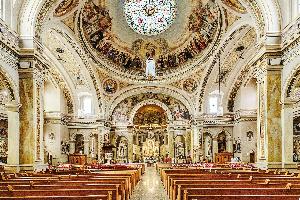Henry W. Worthmann And John G. Steinbach
Henry W. Worthmann And John G. Steinbach;Worthmann & Steinbach Studio
Place: Chicago
Born: 1903
Death: 1928
Biography:
Active in the United States from 1903 to 1928, Henry W. Worthmann (June 18, 1857 – April 11, 1946) and John G. Steinbach (b. 1878) formed a partnership that would leave an indelible mark on American architecture, particularly in the realm of church design.
Early Beginnings and Notable Works
The Worthmann & Steinbach Studio was established in Chicago, with a primary focus on designing large, elaborate churches for Roman Catholic, Eastern Catholic, and Lutheran clients. Their work extended beyond Chicago, with notable projects in Indiana, Michigan, and Wisconsin.
- St. Mary of the Angels Church, a testament to their skill in blending aesthetics with functionality.
- St. John Berchmans Church, showcasing their ability to adapt to diverse architectural styles.
- St. Nicholas Ukrainian Catholic Cathedral, a notable example of their work in the Ukrainian Catholic community.
Architectural Style and Influence
Worthmann & Steinbach's designs were characterized by grandeur, often incorporating elements of Gothic, Romanesque, and Byzantine styles. Their influence can be seen in various churches across the Midwest, reflecting the region's diverse cultural heritage.
Legacy and Preservation
Despite the passage of time, the architectural firm's legacy endures, with many of their buildings remaining as vibrant centers of community life. The partnership's impact on American church architecture is undeniable, cementing their place in the annals of architectural history.
Notable Mention:For a deeper understanding of architectural influences and styles, explore Städtische Galerie im Lenbachhaus, Munich: A Comprehensive Guide, which offers insights into German and Austrian art from the late 19th century to the present day.
For more on architectural masterpieces, visit The Museum Residenz (Würzburg, Germany), a UNESCO World Heritage Site and an outstanding example of Baroque art, design, and architecture.
Conclusion
The collaborative efforts of Henry W. Worthmann and John G. Steinbach have left an indelible mark on American architectural history, particularly in the realm of church design. Their legacy serves as a testament to the power of partnership in creating lasting, beautiful structures that transcend time.
- View more works by similar architects at Dakin & Gallier, known for their Neo-Gothic buildings and public landmarks.
- Explore the world of art and architecture on Wikioo.org.

![St. Hyacinth Basilica in Chicago, interior decoration [Polish parishes and churches in Chicago] St. Hyacinth Basilica in Chicago, interior decoration [Polish parishes and churches in Chicago]](https://img.wikioo.org/ADC/art.nsf/get_small_image_wikioo?Open&ra=D7XB8A)
![Church of St. Mary of the Angels, Chicago, the dome [Polish parishes and churches in Chicago] Church of St. Mary of the Angels, Chicago, the dome [Polish parishes and churches in Chicago]](https://img.wikioo.org/ADC/art.nsf/get_small_image_wikioo?Open&ra=D7XB42)
![Cicero, St. Mary of Czestochowa Church, sculpture [Polish parishes and churches in Chicago] Cicero, St. Mary of Czestochowa Church, sculpture [Polish parishes and churches in Chicago]](https://img.wikioo.org/ADC/art.nsf/get_small_image_wikioo?Open&ra=D7XBDH)
![All Saints Polish National Catholic Cathedral, Chicago [Polish parishes and churches in Chicago] All Saints Polish National Catholic Cathedral, Chicago [Polish parishes and churches in Chicago]](https://img.wikioo.org/ADC/art.nsf/get_small_image_wikioo?Open&ra=D7XBGN)
![Church of St. Mary of the Angels, Chicago [Polish parishes and churches in Chicago] Church of St. Mary of the Angels, Chicago [Polish parishes and churches in Chicago]](https://img.wikioo.org/ADC/art.nsf/get_small_image_wikioo?Open&ra=D7XB2A)
![St. Casimir Church in Chicago, statue of Angel [Polish parishes and churches in Chicago] St. Casimir Church in Chicago, statue of Angel [Polish parishes and churches in Chicago]](https://img.wikioo.org/ADC/art.nsf/get_small_image_wikioo?Open&ra=D7XBE2)

![Church of St. Mary of the Angels, Chicago [Polish parishes and churches in Chicago] Church of St. Mary of the Angels, Chicago [Polish parishes and churches in Chicago]](https://img.wikioo.org/ADC/art.nsf/get_small_image_wikioo?Open&ra=D7XB2G)

![Holy Innocents Church in Chcago, inside view [Polish parishes and churches in Chicago] Holy Innocents Church in Chcago, inside view [Polish parishes and churches in Chicago]](https://img.wikioo.org/ADC/art.nsf/get_small_image_wikioo?Open&ra=D7XB5U)